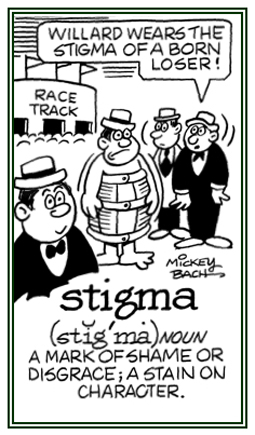stigma-
(Greek > Latin: mark, reproach; shame, disgrace; from Greek, puncture; brand; tattoo mark; point)
2. A reference to a compound lens in which the separate components compensate for the visual defects caused by any unequal curving of one or more of the refractive surfaces of the eyes; usually, the cornea.
An astigmatic condition is a disorder of vision; usually, due to misshapen corneas in the eyes such that light does not focus correctly on the retinas and so a person can only see blurred images.
2. A common form of visual impairment in which part of an image is blurred, due to an irregularity in the curvature of the front surface of the eye, the cornea.
The curve of the cornea is shaped more like an American football or a rugby ball rather than normally as a spherical basketball.
Light rays entering the eye are not uniformly focused on the retina; resulting in blurred vision at all distances and only part of what a person is looking at is in clear focus at any one time.
3. Etymology: coined in form of astigmatic in 1849 by English scientist William Whewell (1794-1866), from Greek a-, "without" + stigmatos, stigma, "a mark, a spot, a puncture".2. A defect in an optical system in which light rays from one point fails to converge in a single focal point.
2. A mark of disgrace or infamy; a stain or reproach; such as, on one's reputation: Harry's character carried the stigma of having been an alcoholic even after he quit drinking and never touched it again.
3. In medicine, a mark on the skin indicating a medical condition; for example, a mark or characteristic indicative of a history of a disease or abnormality: June had stigmas or lesions on her arms showing that she had had severe illnesses when she was a child.
4. In psychology, a mark, or spot, on the skin that bleeds as a symptom of hysteria: In the book that Rebecca was reading, the sister of the main character had a stigma on her right hand that would open with blood gushing out when she was in a delirium.
5. In zoology, a colored mark or spot found on some protozoans and invertebrates: In Jane’s biology class she learned that butterflies, and other lepidopterans, had something like a speck which resembled an eye and was called a stigma.
6. Etymology: a mark burned into the skin of a slave; a brand that identifies ownership. It was also used to identify a criminal.
The Greek element stigma denoted a "mark made on the skin with a sharp implement"; hence, a "tattoo" or a "scar".
By the time the term stigma arrived in English, via Latin, it had acquired the connotation of a "brand of shame"; and it was also used specifically to indicate the specific injuries made on Christ's hands and feet by the nails of the cross.

Go to this Word A Day Revisited Index
so you can see more of Mickey Bach's cartoons.
2. In medicine, a mark or a characteristic indication of a former disease or abnormality.
3. Historically, marks that were burned into the skins of criminals or slaves: In the past, stigmata were brands to indicate who owned the enslaved people or to identify those who were convicted of illegal actions.
2. Normal eyesight.

